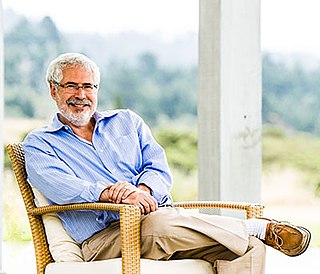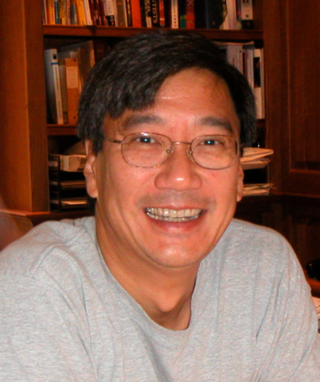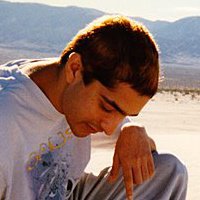Related Research Articles

National Institutes of Health Director's Pioneer Award is a research initiative first announced in 2004 designed to support individual scientists' biomedical research. The focus is specifically on "pioneering" research that is highly innovative and has a potential to produce paradigm shifting results. The awards, made annually from the National Institutes of Health common fund, are each worth $500,000 per year, or $2,500,000 for five years.

Carolyn Ruth Bertozzi is an American chemist and Nobel laureate, known for her wide-ranging work spanning both chemistry and biology. She coined the term "bioorthogonal chemistry" for chemical reactions compatible with living systems. Her recent efforts include synthesis of chemical tools to study cell surface sugars called glycans and how they affect diseases such as cancer, inflammation, and viral infections like COVID-19. At Stanford University, she holds the Anne T. and Robert M. Bass Professorship in the School of Humanities and Sciences. Bertozzi is also an Investigator at the Howard Hughes Medical Institute (HHMI) and is the former director of the Molecular Foundry, a nanoscience research center at Lawrence Berkeley National Laboratory.

Steve Blank is an American entrepreneur, educator, author and speaker. He created the customer development method that launched the lean startup movement. His work has influenced modern entrepreneurship through the creation of tools and processes for new ventures which differ from those used in large companies.
Utkan Demirci is a tenured professor and a successful serial academic entrepreneur at Stanford University at the departments of Radiology and Electrical Engineering. He served as the Interim Division Chief and Director of the Canary Center at Stanford for Cancer Early Detection in the Department of Radiology.
Alice Yen-Ping Ting is a Taiwanese-born American chemist. She is a professor of genetics, of biology, and by courtesy, of chemistry at Stanford University. She is also a Chan Zuckerberg Biohub investigator and a member of the National Academy of Sciences.

Peter S. Kim is an American scientist. He was president of Merck Research Laboratories (MRL) 2003–2013 and is currently Virginia & D.K. Ludwig Professor of Biochemistry at Stanford University, Institute Scholar at Stanford ChEM-H, and Lead Investigator of the Infectious Disease Initiative at the Chan Zuckerberg Biohub.
Richard C. Mulligan is an American scientist who is the Mallinckrodt Professor of Genetics at Harvard Medical School, the Director of the Harvard Gene Therapy Initiative and a visiting scientist at the Koch Institute for Integrative Cancer Research at the Massachusetts Institute of Technology. He is also the head of SanaX at Sana Biotechnology.

Ram Samudrala is a professor of computational biology and bioinformatics at the University at Buffalo, United States. He researches protein folding, structure, function, interaction, design, and evolution.
Adam Ezra Cohen is a Professor of Chemistry, Chemical Biology, and Physics at Harvard University. He has received the Presidential Early Career Award for Scientists and Engineers and been selected by MIT Technology Review to the TR35 list of the world's top innovators under 35.

Aviv Regev is a computational biologist and systems biologist and Executive Vice President and Head of Genentech Research and Early Development in Genentech/Roche. She is a core member at the Broad Institute of MIT and Harvard and professor at the Department of Biology of the Massachusetts Institute of Technology. Regev is a pioneer of single cell genomics and of computational and systems biology of gene regulatory circuits. She founded and leads the Human Cell Atlas project, together with Sarah Teichmann.
Jay Shendure is an American scientist and human geneticist at the University of Washington. He is a professor in the Department of Genome Sciences at the University of Washington School of Medicine and an Affiliate Investigator in the Human Biology Division at the Fred Hutchinson Cancer Research Center. Shendure's research is focused on developing and applying new technologies in genomics. In 2005, his doctoral research with George M. Church resulted one of the first successful proof-of-concepts of next-generation DNA sequencing. Shendure's research group at the University of Washington pioneered exome sequencing and its application to Mendelian disorders, a strategy that has been applied to identify hundreds of disease-causing genes. Other notable accomplishments of Shendure's laboratory include the first whole genome sequencing of a human fetus using samples obtained non-invasively from the parents, and the sequencing of the HeLa genome in agreement with Henrietta Lacks' family.

Feng Zhang is a Chinese–American biochemist. Zhang currently holds the James and Patricia Poitras Professorship in Neuroscience at the McGovern Institute for Brain Research and in the departments of Brain and Cognitive Sciences and Biological Engineering at the Massachusetts Institute of Technology. He also has appointments with the Broad Institute of MIT and Harvard. He is most well known for his central role in the development of optogenetics and CRISPR technologies.
Elizabeth Marie Nolan is an American chemist and associate professor at Massachusetts Institute of Technology.

Karla Kirkegaard is the Violetta L. Horton Research Professor of genetics at the Stanford University School of Medicine. She was the chair of the Department of Microbiology and Immunology from 2006 to 2010. She is an elected member of the American Academy of Arts and Sciences and the National Academy of Sciences. Her research focuses on virology.
Rediet Abebe is an Ethiopian computer scientist working in algorithms and artificial intelligence. She is an assistant professor of computer science at the University of California, Berkeley. Previously, she was a Junior Fellow at the Harvard Society of Fellows.

Jennifer (Jen) Dionne is an American scientist and pioneer of nanophotonics. She is currently full professor of materials science and engineering at Stanford University and by courtesy, of radiology, and also a Chan Zuckerberg Biohub Investigator. She is Deputy Director of Q-NEXT, a National Quantum Information Science funded by the DOE. From 2020-2024, she served as Stanford's inaugural Vice Provost of Shared Facilities, where she advanced funding, infrastructure, education, and staff support within shared facilities. During this time, she also was Director of the Department of Energy's "Photonics at Thermodynamic Limits" Energy Frontier Research Center (EFRC), which strives to create thermodynamic engines driven by light. She is also an editor of the ACS journal Nano Letters. Dionne's research develops photonic materials and methods to observe and control chemical and biological processes as they unfold with nanometer scale resolution, emphasizing critical challenges in global health and sustainability.

Luciano Marraffini is an Argentinian-American microbiologist. He is currently professor and head of the laboratory of bacteriology at The Rockefeller University. He is recognized for his work on CRISPR-Cas systems, being one of the first scientists to elucidate how these systems work at the molecular level.
Cigall Kadoch is an American biochemist and cancer biologist who is Associate Professor of Pediatric Oncology at the Dana–Farber Cancer Institute and Harvard Medical School and an Investigator at the Howard Hughes Medical Institute. Her research is focused in chromatin regulation and how changes in cellular structure can lead to human diseases, such as Cancer, Neurodevelopmental disorders, and others. She is internationally recognized for her work on the mammalian SWI/SNF complex, a large molecular machine known as a Chromatin remodeling complex. She was named as one of the world's leading scientists by MIT Technology Review, 35 Under 35 and Forbes 30 Under 30, and a Finalist for the Blavatnik Awards for Young Scientists. In 2019, she received the Martin and Rose Wachtel Cancer Research Prize from the American Association for the Advancement of Science and in 2020, the American Association for Cancer Research Outstanding Achievement in Basic Cancer Research Award. Kadoch was also recognized as one of the 100 Influential Women in Oncology by OncoDaily.
Bianxiao Cui is the current Job and Gertrud Tamaki Professor of Chemistry and a fellow of the Stanford Neuroscience Institute at Stanford University.
Clifford P. Brangwynne is a professor of chemical and biological engineering at Princeton University, the director of the Princeton Bioengineering Initiative, and the June K. Wu ’92 Professor in Engineering. He is also a researcher at the Howard Hughes Medical Institute.
References
- ↑ "Harbury Lab". cmgm.stanford.edu. Archived from the original on June 2, 2013.
- ↑ "News". Stanford News. January 23, 2023. Archived from the original on January 24, 2023.
- ↑ "CAP - Pehr Harbury". med.stanford.edu. Archived from the original on June 9, 2011.
- ↑ "Pehr Harbury". www.macfound.org. Retrieved April 24, 2023.
- ↑ "NIH Director's Pioneer Award - 2005 Recipients". Archived from the original on March 29, 2010. Retrieved April 4, 2010.
- ↑ "People: Another triumph for Pehr Harbury (October 05, 2005)".
- ↑ "Searle Scholars Program : 2005 News Archive". www.searlescholars.net. Archived from the original on April 1, 2009.
- ↑ "1999 Young Innovators Under 35: Pehr A. B. Harbury, 34". Technology Review. 1999. Retrieved August 14, 2011.